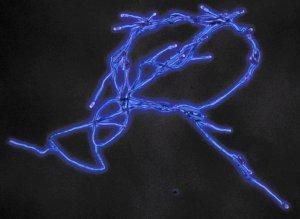
Acremonium alcalophilum is the only known cellulolytic fungus that thrives in alkaline conditions that can be cultured readily in the laboratory. This fungus was isolated from sludge of pig manure compost. Its optimal conditions for growth are 30°C and pH 9.0-9.2. Studies on bacteria and fungi that can tolerate a broad pH range suggest that adaptation to high pH conditions involves products that function in the extracellular region or at the cell boundary. Hence the genome sequence of A. alcalophilum is expected to provide a rich genetic resource for identifying extracellular enzymes with pH optima in the alkaline range. Enzymes stable and catalytically active at alkaline pH would be useful in the degradation of lignocellulose found in manures of farm animals. These enzymes would also find applications in detergent and other processes requiring alkaline environment. In addition, analysis of the genome sequence of this unique fungus would enhance our understanding of the ability of eukaryotes to flourish in alkaline conditions.
Genome Reference(s)
Steindorff AS, Aguilar-Pontes MV, Robinson AJ, Andreopoulos B, LaButti K, Kuo A, Mondo S, Riley R, Otillar R, Haridas S, Lipzen A, Grimwood J, Schmutz J, Clum A, Reid ID, Moisan MC, Butler G, Nguyen TTM, Dewar K, Conant G, Drula E, Henrissat B, Hansel C, Singer S, Hutchinson MI, de Vries RP, Natvig DO, Powell AJ, Tsang A, Grigoriev IV
Comparative genomic analysis of thermophilic fungi reveals convergent evolutionary adaptations and gene losses.
Commun Biol. 2024 Sep 12;7(1):1124. doi: 10.1038/s42003-024-06681-w
